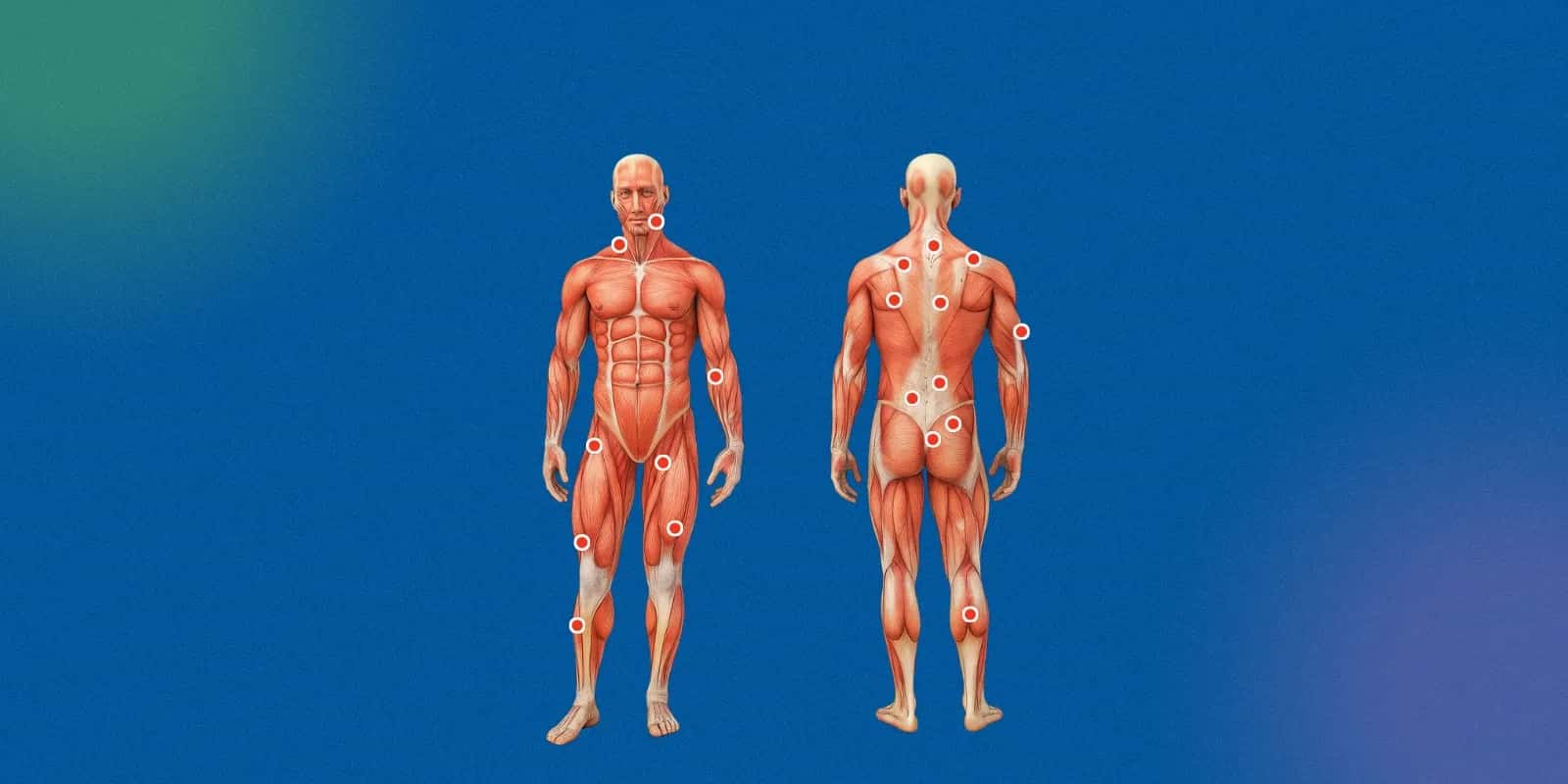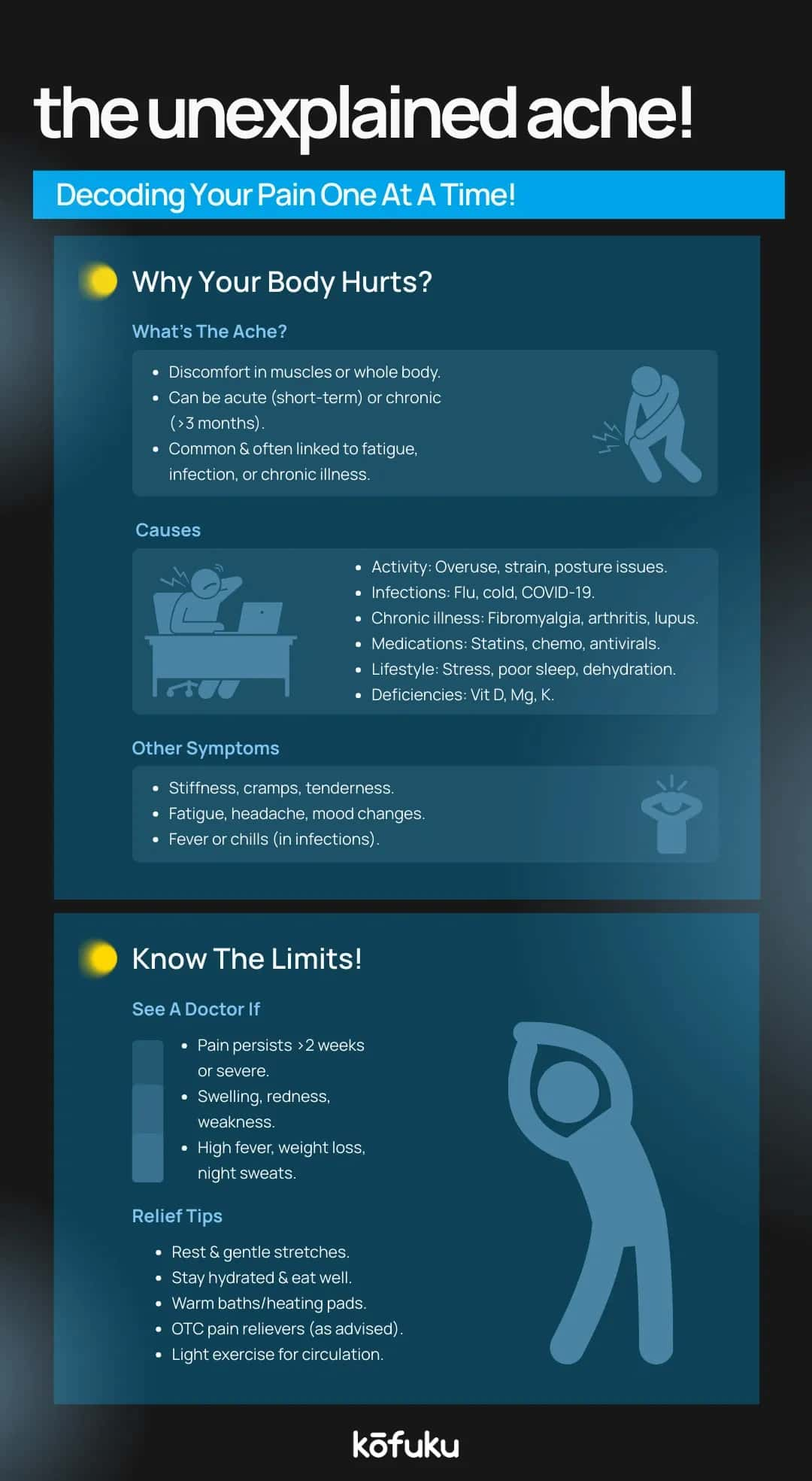Understanding Muscle Pain and Bodyache: What They Mean and Why They Occur


Introduction
Have you ever woken up feeling stiff or with a body ache that you can not explain, making it hard to move normally throughout the day?
Muscle pain and bodyache are a part of the everyday life of many people in India, especially for those juggling between long hours at the desk, homework, or arduous physical work.
While you can treat these pains as temporary inconveniences, they can also signify some underlying health problems. The trick to managing bodyache effectively is learning how to distinguish between usual and troubling symptoms of fatigue.
This blog will help you understand the common causes of muscle pain, treatment, when to seek medical advice, and more.
Common Causes of Muscle Pain and Bodyache
The reasons for muscle pain are many, from lifestyle behaviours on the one hand to major medical problems. The most typical cause is overexertion or strain for most people.
The soreness can result from micro-tears that occur in muscle fibres when exercising intensively, assuming a bad posture, or even doing repetitive movements. This is often short-term and clears with rest.
Viral infection is another common reason. Generalised bodyache is brought about because the body reacts to the flu or common cold with inflammatory actions.
Other diseases, such as dengue, chikungunya, or malaria, are also characterised by intense pain in muscles and joints. Early treatment is crucial in such cases to avoid complications.
Anxiety and stress are not usually the measured players. Stress may lead to muscle tension, which will make them tight, particularly in the neck, shoulders, and back. Poor sleep prevents the body from producing tissue, leading to constant body pains.
Why Do People Experience Bodyache in the Morning?
Bodyache in the morning is an issue that many people complain about, as it interferes with their day. There are several reasons why you may experience a bodyache in the morning, such as:
-
Poor Sleeping Position: Resting in awkward postures strains muscles and joints, causing stiffness and pain upon waking.
-
Inadequate Mattress or Pillow Support: Old mattresses or pillows that do not support spinal alignment can contribute to morning body pain.
-
Lack of Movement Overnight: Remaining in one position for extended hours reduces blood flow, leading to stiffness and soreness.
-
Underlying Health Conditions: Arthritis, vitamin deficiencies, or inflammatory diseases can worsen morning aches.
-
Dehydration: Muscles require adequate hydration for proper function. Overnight fluid loss without replenishment may intensify discomfort.

Symptoms Associated with Muscle Pain and Bodyache
Sometimes, a bodyache means more than just nagging discomfort. This is generally when it is associated with other symptoms that help to indicate what might be causing it. Symptoms that often accompany include:
-
Fatigue and weakness
-
Headache or fever in viral infections
-
Swelling and redness in inflammatory conditions
-
Stiffness and restricted movement in arthritis
-
Muscle twitching or cramps from electrolyte imbalance
How to Identify Serious Causes of Widespread Muscle Pain
Most instances of bodyache can be treated with self-care, but some red flags may possibly point to deeper issues. See a doctor if you have:
-
Persistent muscle pain lasting more than two weeks
-
Sudden severe pain without a clear cause
-
Pain accompanied by difficulty breathing or chest tightness
-
Muscle weakness with inability to perform normal activities
-
Pain associated with significant swelling, redness, or fever
Treatment and Home Remedies for Muscle Pain and Bodyache
Muscle pain and bodyache can be treated depending on their cause. In the majority of individuals, the combination of rest, hydration, and over-the-counter medications works.
-
Rest and Sleep: Allowing the muscles to recover is crucial, particularly after strenuous activity.
-
Hydration: Adequate water intake prevents dehydration-related cramps and stiffness.
-
Warm Compress: Heat packs relax tense muscles and improve blood circulation.
-
Cold Compress: Useful for acute injuries or swelling, reducing inflammation.
-
Stretching and Yoga: Gentle movements increase flexibility and reduce stiffness.
-
Over-the-counter Medicines: Nonsteroidal anti-inflammatory drugs (NSAIDs) may provide temporary relief for moderate pain.

Managing Morning Body Pain: Tips for a More Comfortable Start to Your Day
If bodyache in morning is a persistent issue, making some tiny changes to your lifestyle can make things easier:
-
Sleep on a Supportive Mattress: Choose one that aligns with the natural curve of your spine.
-
Maintain Proper Posture: Sleeping positions such as lying on the back with a pillow under the knees can reduce strain.
-
Stretch Before Bed and After Waking: Light yoga or stretching improves circulation and reduces stiffness.
-
Stay Hydrated: Drinking water before sleep and after waking replenishes lost fluids.
-
Consider Nutritional Supplements: Vitamin D, calcium, and magnesium support muscle health, but should only be taken after medical advice.
When to Consult a Doctor for Muscle Pain or Bodyache
Bodyache can indicate something more serious, although it is often temporary. A visit to a medical doctor is crucial when:
-
Pain is severe and sudden
-
Symptoms worsen despite self-care
-
Pain is accompanied by high fever, rashes, or unexplained weight loss
-
Muscle weakness interferes with daily activities
-
Chronic pain persists beyond two weeks
To provide a diagnosis of the underlying problem, blood tests, imaging, or physical examination may be performed by an orthopaedic doctor, a rheumatologist, or a general physician. The earlier the diagnosis and treatment, the fewer the complications and the faster the treatment.

FAQs
Q. What causes muscle pain and bodyache?
A. Muscle pain and bodyache can be caused by overexertion, viral infections, stress, dehydration, poor posture, vitamin deficiencies, or chronic conditions like arthritis and fibromyalgia.
Q. What does bodyache mean?
A. Bodyache means generalised discomfort, soreness, or pain across different parts of the body, often linked to fatigue, infections, muscle strain, or underlying health conditions.
Q. Why do I feel a bodyache in the morning?
A. Morning bodyache often results from poor sleeping posture, inadequate mattress support, dehydration, lack of movement overnight, or chronic conditions like arthritis and vitamin deficiency.
Q. What are the common causes of morning body pain?
A. Common causes include poor sleep posture, old mattresses, dehydration, stress, arthritis, vitamin D deficiency, and reduced blood circulation due to prolonged stillness during sleep.
Q. How can I relieve morning body pain naturally?
A. Morning body pain can be relieved by gentle stretching, hydration, proper mattress support, regular exercise, correct posture, and warm showers to relax stiff muscles.
Q. When should I see a doctor for a bodyache or muscle pain?
A. See a doctor if pain is severe, persistent beyond two weeks, associated with fever, swelling, unexplained weight loss, weakness, or difficulty performing daily activities.
Q. Can dehydration cause muscle pain or bodyache?
A. Yes, dehydration reduces electrolyte balance and blood circulation, leading to muscle cramps, weakness, and bodyache. Staying hydrated is essential for preventing such discomfort.
Q. What medicines are used for muscle pain and bodyache?
A. Common medicines include nonsteroidal anti-inflammatory drugs (NSAIDs) like ibuprofen, paracetamol for pain relief, and muscle relaxants if prescribed; treatment depends on the underlying cause.

Can Managing Emotions Help Us Control Chronic Pain? A Deeper Dive

What Causes Back Pain and How a Daily Walk Can Reduce Your Risk

Dead Butt Syndrome - You Should Worry About This

Thunderclap Headaches: Causes, Symptoms, and Treatments

Body Recomposition Explained: Burn Fat and Build Muscle Together

Serratus Anterior Muscle: Why and How to Develop The Boxer's Muscle

Muscular Dystrophy: Understanding Muscle Weakness and Health Deterioration

